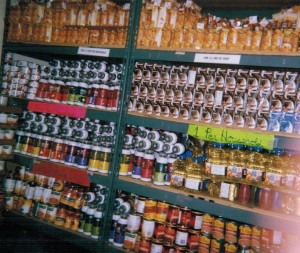Exploring the Spirituality of Hunger in America – New Beginnings Part 1
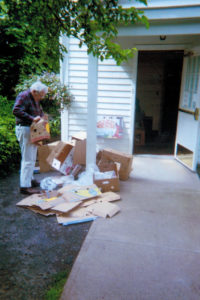
Part 1
I began this memoir before I even knew it. On the first day I worked in the basement food pantry, I sat with Mary, a member of St. Gregory’s Episcopal Church and the head of the alter society. We greeted a couple dozen hungry people. Mostly single homeless men, there were a few of Woodstock’s famous colorful characters included in the mix that day.
Throughout my career in the pantry, the most colorful of the colorful was Grandpa Woodstock who liked to bring his bride, Lady Estar into the pantry to shop. The two of them went around the room choosing from peanut butter, cereal, tuna fish, and soup. While this happened, he entertained us gushing enthusiastically.
“My, how beautiful you look today!” I fell for his spiel every pantry day. Those words melted my heart. The most professional of the street actors, he knew how to make us each feel special when he flashed his peace sign and posed for photographs. Grandpa knew how to flash that peace sign, whip out his postcards to sell, and sound off his horn “toot toot”. I sometimes thought he spent a few afternoons posing in front of a mirror to figure out how to get the best response from tourists.
Grandpa Woodstock and Lady Estar were most photogenic with their long, flowing silver hair. Their lovely matching beards only emphasized floral print silk skirts and kimonos. Their toenails were painted matching colors and their Teva sandals matched.
None of Woodstock’s rich and famous got so many requests for autographs and photographs. They simply couldn’t compete with his show off tricks.
After all, Grandpa entertained us all with street theater at its finest. So what if he didn’t mean a word of it? We all enjoyed being sucked into the show!
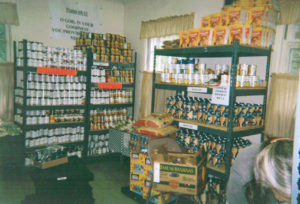
 Thank you for reading this article. Please refer it to your preferred social media network.
Thank you for reading this article. Please refer it to your preferred social media network.
Thurman Greco

Hunger: An Introduction
The first time I ever saw a child begging for food was in Mexico. I was on a car trip going through Monterrey on the way to visit my future in-laws in Mexico City. When we parked the car in front of a restaurant, children immediately surrounded the vehicle. Small children held their hands out, asking for money for food. Each held up little brown palms. Their pleading faces looked into my eyes.
At that time, I didn’t yet speak any Spanish, but I didn’t need a vocabulary beyond English to understand the situation. Their body language spoke of expectations, hope and hunger.
“Don’t worry yourself about this Coit. They’re just after a few pesos.” My soon-to-be husband tried to comfort me. In my heart I knew different. The child we discussed was about the size of a thin eight-year-old. Teeth don’t lie though. He had a mouth full of adult teeth. That put his age at about twelve years.
In Mexico, children dig through trash for food. And, nine years after this road trip, in Mexico City, a beautiful young Indian woman standing on a corner tried to sell her infant. She approached my church friends first, an American couple in Mexico City on a study visa. Bob and Sue felt they couldn’t get the baby over the border when they returned to the U.S. at the end of their class. I wasn’t a good candidate because, at the time we discussed the baby, I was still married, had no visa or citizenship papers, and didn’t feel I was ever going to cross back over the river heading North.
Whatever happened to that beautiful baby? Whatever happened to her desperate mother? I’ll never know.
You want to talk hunger, then let’s discuss Venezuela and Mexico for a while. Even now, years later, I remember each encounter with a hungry person or household as if it happened only yesterday. I’ll never forget those people, the look of hunger in their eyes.
When people wanted to talk to me about hunger in America, it was a nonissue. Hunger in America? Whoever heard of such a thing?
Hunger has been with us in this country since the beginning. Famous American history stories include Pilgrims starving over the first winter in their new home. The stories of Mormons starving when they headed west are just two. These stories are different from segments of our population going to bed hungry because there isn’t enough money for food.
Even though I’m the loudest mouth in the crowd when I talk about hungry people in America, I’ve never seen hungry children begging for food when I park my car outside a store or restaurant.
Somehow, in this country, hungry people keep themselves hidden unless they are in the food pantry or soup kitchen line.
I lived in both of those places. I could talk hunger with you “until the cows come home,” as my grandmother said. But America? “Fuggedaboutit,” as I heard someone say once on a Brooklyn bus tour.
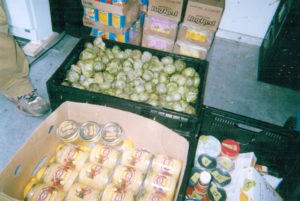
Thank you for reading this blog post. It is an excerpt from “The Ketchup Sandwich Chronicles”. I’ll be posting more stories from this book in the coming days.
I hope you enjoy them. If so, please refer the posts to your favorite social media network.
But, whether you refer them or not, I thank you for reading this story.
Thurman Greco


It’s Vacation Time!
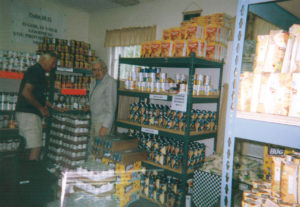
Your vacation time is here! It’s your last chance to get a break this summer. That means it’s time to go to the beach – to the mountains – to the city – ANYWHERE!
What do you have to do to get away? Well, first, find a place to go. Second, pack your bags.
FINALLY, drop off loads of food to your neighborhood food pantry before you take off on your vacation..
August is the most challenging month of the year for food pantries because it’s the month with the least amount of food available at the food bank. Food pantries get most of their food from donations and very few people donate in August. And, sadly, this carries right through to September. September brings school openings with parents getting ready for school lunches. Food pantries are often empty.
It’s my opinion that people don’t donate food to food pantries in August because they’re focused on their own activities: vacation, getting kids ready for school.
But, your neighborhood food pantry doesn’t have to be empty. There are things you can do. You can organize a food drive in your neighborhood and take the food to the food pantry. You can keep the food flowing right through to October.
Thank you in advance for thinking of things you can do for your food pantry during the leanest months of the year.
Please refer this article to your preferred social media network.
Thurman Greco

Are You Working On or Off?

A fairly common question I heard in the pantry line: “Are you working on or off?”
The first time I heard this question, I was confused. What did it mean? Actually, it referred to whether or not the person was paid in cash under the table or was paid money with withholding taken out.
Often the answer was something like: “I’ve got two days over at the food store and three days at Mrs. O……’s where I help her with her house and her office. I’m looking for a few more hours but it’s not happening.”
What this question asked was how many hours a person worked on the books and how many hours off the books. Not only was this practice illegal but it robbed workers of any benefit accrual and the opportunity to pay taxes.
Minimum wage paychecks simply don’t last a week. Individuals, families, entire households even can be employed and still live in poverty. My experience in the pantry was that more people in the pantry shopping line are employed than not.
I used to think of people as being employed or unemployed.
As I gained experience with the situation, I added another label: underemployed. So, rather than thinking in terms of employed or unemployed, I thought of hungry people in the line as being employed or underemployed.
I still see unemployed people but I realized many people aren’t paid a living wage.
I see shoppers where each person in the household works more than one job. The hope, dream, goal for many is simply to work enough hours and make enough money that a person can take a day off occasionally and have enough money to eat the following day.
People holding down more than one job often had trouble finding time to get to the Department of Social Services office to apply for SNAP (food stamps), although they might have qualified for the benefits.
Without a secure community safety net for the poor and destitute in our country, pantry volunteers needed to feed groceries weekly to families and households without money after they paid for rent and transportation to get to work.
Since the ’90s, many states have been “hell bent to Harry” to get people to work…no matter what. Welfare is no longer on the table.
A tip: Some people don’t realize our nation hasn’t offered much in the way of welfare in a long, long time. In polite conversation, I heard a statement: “That person shouldn’t be in your line. Her son has a job and she has a car.” I find it amazing that people in this country have been and continue to be comfortable denying assistance to the needy and destitute families while offering tax breaks to the wealthy.
My question was this: “How do people cope?”
Work first is not always a good option. I regularly saw pantry shoppers with family members who would be institutionalized if they weren’t being cared for by family. The institution is always the more expensive option.
The problem was that the family had nothing. So, while Helen or Sue or Fred was caring for the ill/disabled person, s/he wasn’t able to work.
Employment opportunities are a large part of the problem. People find themselves down and out in places with few job opportunities. Young people graduated from high school or college and can’t find a job anywhere.
Every economic downturn erases job opportunities. When the economy finally recovers, many jobs don’t return. Each recovery creates a class of citizens permanently living in the poverty of unemployment, underemployment, temporary employment, and day labor. Part time employment and being “on call” is a way of life.
The new group created after the downturn of 2008 had its own label: The Struggling Class.
Education costs are a factor. Fewer and fewer people can afford college or trade school. Some are afraid of the college loans they might not be able to pay off. One young woman in our food pantry line worked sixty hours weekly in low wage jobs to repay her college loan.
A fundamental attitude adjustment helped us realize food stamps, food pantries, soup kitchens, and shelters are no longer emergency concepts. They are the new way of life in the 21st century.
BEN
“I’m finished!” he blurted out. ” They fired me today!” I’ll never be able to get another job again. I’m too old!” Frightened reality covered his face when he entered the pantry for the first time. I didn’t say a word. I let him shout. He didn’t look or act as if he was going to hurt anyone and I felt he needed to release his anger.
I wanted his life to be easier than it was but what I wanted for him or any other shopper was nothing more than wishful thinking. There was little to nothing I could do. And, truthfully, I was helpless to do anything for him beyond offering a three-day-supply of food.
Every week after the first visit, he entered the pantry, shopped, and never made a sound. The mask of his face never changed.
Once the hair goes grey, it’s hard to compete in the market place. In a down economy, employers hire the younger applicants believing they’ll work harder for less money.
I hoped his unemployment would hold out until he could figure out how to get something more.
We all just left him alone. The pantry space was so small. It took him a year to calm down.
All we had was delicious, nutritious, food with a heavy emphasis on fresh vegetables and fruits. I relied on the food to make up for what we didn’t have.
I saw him recently – calm, maybe at peace with his situation. He lives in his truck, semi-homeless I suppose. He has places to bathe and sleep when he’s in Woodstock.
Woodstock attracts musicians. He’s one of those considered talented, this man. He’s found places to play around the area and he’s looking okay. What more can we all ask for anyway?
Thurman Greco
Thank you for reading this blog post. Please refer it to your favorite social media network.
Thurman
A new book is coming soon! Please be on the lookout for Miracles!
Thanks again!
My Search – The Food Pantry Needs a Refrigerator – “The Ketchup Sandwich Chronicles”
The pantry had a refrigerator and I needed a place to put it. But, to begin at the beginning, the food pantry had hungry people wanting and needing the hundreds of dozens of eggs we got from the food bank and Aldi’s.
Pantry volunteers needed a place to store the eggs before we distributed them. Where, oh where, could I put the refrigerator?
Early on pantry day, when I packed eggs in my car, nothing much else fit. Reusable shopping bags filled with eggs were in the rear hatch, on the seats, and on the floor. I felt like I was driving an egg mobile instead of a Prius. The only negative was refrigeration.
Each new food group added to the pantry shelves changed the dynamic, the pace of shopping in the room. Eggs were a huge addition. They were cheap. They didn’t take up much space but packed a nutritional punch. They were easy to cook. They were in big demand every time they were available in the pantry.
At the Food Bank of Northeastern New York in Latham I bought thirteen cases of loose eggs at a time whenever I could get them. When food bank stock was depleted, I bought over a hundred dozen eggs at a time at Aldi, a food store located at 767 East Chester Street in Kingston, across the road from Prestige Toyota. Aldi was the only local store willing to sell eggs to the pantry.
I tried to buy eggs at local farms and at Adams Fairacre, ShopRite, and Hannaford’s in Kingston. Nobody would sell eggs to the pantry because over a hundred dozen eggs were just too many and the pantry need wasn’t steady enough.
Aldi didn’t mind though. The store manager kept hundreds of dozens of eggs behind the glass door of a refrigerator case on the back wall of the store. All I had to do was open the door, wheel out the egg trolley, and load all the eggs I needed in large, reusable shopping bags which I brought with me. It took four shopping carts to get the loaded eggs to the checkout clerk.
I spent several months quietly searching for the refrigerator space I needed. I had a refrigerator and I just needed a place to put it. Then I got serious. I began with the church.
“Pastor, the pantry needs a refrigerator for eggs.”
“The pantry room is too small and the building committee won’t allow it.”
Next, I called around Woodstock from a list I’d made of people who might be willing to help me out. After the pastor, the Town Supervisor was top of the list. I was on his election committee when he successfully ran for office.
“Hi. I’m looking for refrigerator space for the pantry. Can I put one in the Community Center kitchen? I’ll donate it to the town. I just want to use it one day each week for eggs.”
“No.”
“Thanks.” Well, I thought, it’s a good thing I made a list!
I knew Woodstock Democratic Committee members. One was even on the Woodstock Town Board.
“I’m looking for refrigerator space for the pantry. I’ve got the refrigerator, I just want to use it one day a week for eggs. Do you know someplace in town where we can put one?”
“I’ll ask around and see what I can find.”
“How about Town Hall? There’s a large empty room there.”
“That won’t work. We’re going to renovate that building.”
My list is getting me nowhere fast, I thought.
At the end of the church parking lot stood a long, dirt floored, unpainted, rattlety trap building, a storage space for the popular Woodstock Village Green Bed and Breakfast. If I could get a corner in that old barn, I could put a refrigerator on a pallet. Dare I hope? I didn’t know the owners personally, but there didn’t seem to be any other options. So, I picked up the phone and called.
“I’m wondering if the pantry can rent a little corner of your barn for a refrigerator. I’m desperate for a place to store eggs. I’ve asked everyone and you are my absolute last hope.”
I might be able to pull this one off, I thought. When the pantry inspectors come, I just won’t mention the barn. I had to rely on food bank inspectors looking the other way and not asking about the food bank eggs.
One of the owners called back. “We can do this and there won’t be any charge.”
“Thanks. You’re going to heaven for this.”
“The refrigerator in the barn worked fine. Volunteers distributed eggs to shoppers on pantry day. Over time, local residents donated refrigerators and freezers.
Shopper census rose until we outgrew our small storage closet in the hallway.
“I need space Pastor. If you can’t spare a room for the pantry, I’ll just have to ask volunteers to bring the next shipment to my home where I’ll put it in my healing space. This is our biggest shipment yet, 3,000 pounds. The food is coming in.”
Each monthly shipment from the food bank up to this point had totaled less than 2,000 pounds. Pastor appealed to his consistory and the building committee. Word on the street was that many meetings followed and the pantry finally got, somehow, permission, maybe, to use the room at the end of the hall.
Food delivery day arrived and volunteers put food in the room. As they brought boxes into the room, I looked around. Nobody was there at the moment. The universe is on my side, I thought.
I hurried upstairs to the church office where I found the secretary. “We’re so happy to be able to store food in the room. Do you think it’ll be okay to bring a refrigerator in? This would mean we can keep eggs in the storeroom.”
Slowly, she smiled. “Sure, bring it in.”
Within minutes after I spoke with her, two men carried a refrigerator to the store room. “Put it against this wall,” I said, pointing to the one place where it would be least obvious.
At the end of the morning, building committee members inspecting the new storeroom saw a room full of food and a refrigerator filled with eggs. They were not happy.
I thought the pastor’s secretary was the number two person in the church so I went with her okay. The expressions on their faces taught me that the only people with any authority in that church were the building committee members.
From that morning on, pantry volunteers filled the stockroom to capacity with the food we got from the food bank. The refrigerator hummed along as we stacked eggs on every shelf in it weekly.
I don’t think I got permission to use the room permanently. It was a squatter’s rights kind of thing. Once I got the food in there, they couldn’t get me out. Before it was all over, the pantry received shipments every month exceeding 12,000 pounds.
The storeroom was a wonderful addition to the pantry. We routinely ordered food for advance needs during lean months and the refrigerator stored eggs.
The storeroom made all the difference.
Same with the barn. The dirt (mud when it rained) floor was permanently covered with flattened cardboard boxes and the refrigerators and freezers were stacked on pallets.
Was I wrong to have been so pushy?
Well, I don’t think so. I did make one mistake, though. I should have moved all the refrigerators and freezers into the storeroom that morning.
There were enough outlets.
Thank you. Thank you. Thank you for reading this article. Please share it with your favorite social media network.
Thurman Greco
Woodstock, New York
P.S. Please stay tuned for future chapters from my upcoming book “The Ketchup Sandwich Chronicles”.
I Need a Gun – “Ketchup Sandwich Chronicles” – Hunger is not a Disease

“How much is an application for a gun permit?” I was the only cotton topped little old lady in the line at the Golden Hill government office in Kingston.
The counter person, an overweight man in his fifties, could hardly contain his laughter as he handed me the gun permit application. “That’ll be $5.00 please, miss.”
After handing him the money, I started to walk away. Then, turning back to him, I said pleasantly, “Will you sell me three more applications, please? A couple of the girls in my senior yoga class asked me to get applications for them, too.”
Pulling out $15.00 more, I put the money on the counter. The man gave me three more gun applications and I walked away. I had no idea who was going to receive them and I didn’t attend any senior yoga class but I remembered the old “Alice’s Restaurant” song about three people doing something and being part of a movement.
Things in the pantry were negative and confrontational since the first day I drove up with fresh produce for the hungry people shopping in the pantry. In the beginning, I tried to hide things and overlook the situation. Frankly, I hoped the negativity would just go away. And, of course, I was mistaken. Situations like that don’t just evaporate. People don’t just change. And now, I was beginning to tire of the whole situation. I’d been living with fear for years and was feeling like it was time to try to fix things.
Maybe a gun will help, I thought.
When I got home, Barry was sitting on the sofa, surrounded by his cats, Fizzle and Carrots, as he read his latest thriller.
“Hi, honey. How’s your day going?” Without looking up, he took a few grapes from a large fruit filled bowl on a table by the sofa.
“Here’s the application for the gun permit I just got. I want you to teach me to shoot a gun.”
“What!?”
“You can do it. You didn’t spend all those years sneaking off to the CIA without knowing how to use a gun. They even gave you a medal or something. For all I know, you’re a damn bazooka expert. Maybe I want to learn that, too!”
“You can’t do that! You might shoot one of the Chihuahuas.”
“Well, I’m tired of asking pantry volunteers to be bodyguards. It’s not safe when I’m working after hours at the pantry. And, I’m not one bit afraid of the shoppers.”
“Listen, I know your job is difficult. Not even a Marine drill sergeant would do what you’re doing. But, I don’t know about a gun.”
“That Mag-Lite I bought a while back just isn’t what I need. A gun is more powerful and I’ve lived with them my whole life. My grandmother kept a rifle in her bathroom.”
“T.G. you’re just not the gun type. I’ll teach you to use a knife. A good knife won’t cost as much as a gun and you won’t need a permit. You won’t need to buy bullets. There’s nothing to clean unless you stab someone. It’ll be easier to use and carry. I’ll give you some lessons. Nobody will ever know. It’ll be our secret. Leash up the Chihuahuas. We’re going to Warren Cutlery in Rhineback.”
And so he did. He took me to Warren Cutlery where there was a generous selection of knives. We went into the knife room which included stock for kitchens as well as other knives not designed to slice and chop onions. I stood in front of the case. “Which knife are you interested in?” The clerk spoke to me as though showing weapons to a cotton topped old lady was the most boring thing he did all day. And, maybe it was.
“I’d like to see the one over there with the four-inch blade, please.” I held it in my hand and then asked to see several more on display in the case. Barry walked over to the case, stood beside me, and saw the knife I held in my hand.
“That knife is too big and too heavy.” he said, pointing to a smaller model. “You need something you can carry in your purse and you need something you can open rapidly. If you’re too slow, your attacker will have you down before you get it open.”
So, I chose a smaller, lighter model that happened to be on sale.
Barry paid the bill, and off we went.
He did just what he said he would. He taught me how to open a knife quickly but never bothered teaching me to close it.
And, he was correct. A knife is quiet. It weighs less than a gun. There’s no need for a permit. The Chihuahuas won’t get shot. And, unless I go through a metal detector before I take it out of my purse, no one has a clue.
Before it was over, he bought me a second knife which I kept open on the pantry counter next to the large Mag-Lite, ostensibly to open the cardboard boxes.
Thurman Greco
Woodstock, New York

Thank you for reading this story. It is, for now, the first chapter in “The Ketchup Sandwich Chronicles.”
Please share this post with your favorite social media network.
Author’s Note – “Ketchup Sandwich Chronicle”

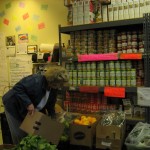
“Ketchup Sandwich Chronicles” is about the spiritual journeys of pantry shoppers and volunteers experiencing hunger and incredible change as they traveled toward renewal and reclaimed lives. This story is, as yet, unknown to many people because hunger as it exists in food pantries, soup kitchens, shelters, is still a taboo subject in our country.
Events and conversations in this book took place over a period of several years when I coordinated the Good Neighbor Food Pantry in Woodstock, New York.
Whenever possible/practical I reviewed material with people who helped reconstruct events, chronology, and dialogue. Based on these reviews and my own notes, some of these incidents were compressed, consolidated or reordered to accommodate memories of everyone consulted. This memoir was edited and rearranged over many drafts in an effort to be as accurate as possible.
All dialogue is based on my memory and the notes I took. The names of most of the characters (mainly, the shoppers) were changed. The names of some were omitted. Even so, there are no composite characters in this memoir.
If you read a sentence, page, paragraph or even a chapter that you feel is outrageous or untrue, it is nonetheless very real. Everything written in this book actually happened. It’s my story.
Peace and food for all.
Thurman Greco
Woodstock, New York
Thank you for reading this article. And, thank you in advance for reading this new book. I’ll be sharing it with you in the coming months. I hope you enjoy it. Please share it with your favorite social media network.
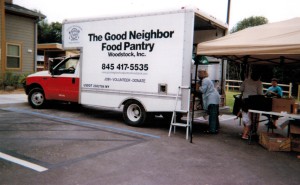

Thank You From Hunger is Not a Disease

Thank you in advance for standing with the hungry, believing in the dignity and humanity of those in the pantry, and for joining in the solution.
2019 is still new and I’m beginning the year with a new story: “The Ketchup Sandwich Chronicles”.
Throughout the coming year, chapters from this new book will appear as the book develops and becomes its own entity. Thank you in advance for reading them.
It’s time for the chapters to each find a place in the story. So, when you read them, you make this chronicle a reality.
Thank you for making this work possible.
Thurman Greco
Woodstock, New York
Please share this post and its follow on chronicle chapters with your favorite social media network.
The first chapter, “I Need a Gun” will be posted in the next few days. I sincerely hope you’ll like it. – TG
